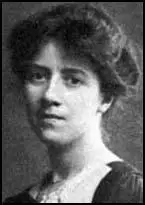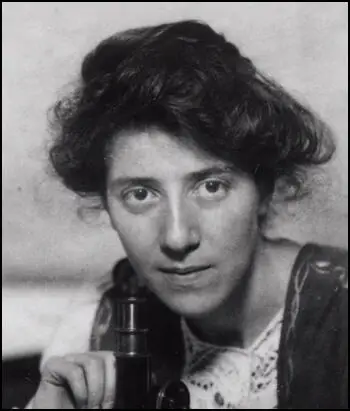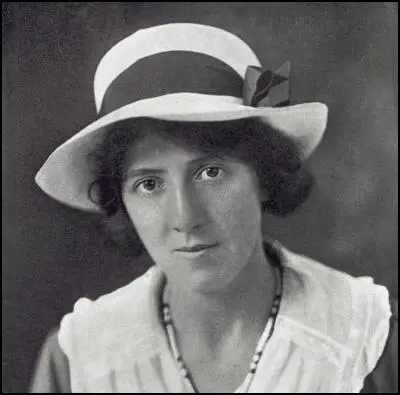Marie Stopes

Marie Stopes, the elder daughter of Henry Stopes (1852-1902) and Charlotte Carmichael, (1840-1929) was born in Edinburgh on 15th October, 1880. Her father was an architect from a wealthy brewing family. Her mother was the daughter of the artist, J. F. Carmichael, was the first woman in Scotland to obtain a university certificate.
At university Charlotte Stopes was not allowed to attend lectures and although she took the same examinations as the male students, because she was a woman she was awarded a certificate rather than a degree. Charlotte's university experiences turned her into a passionate feminist and made sure her daughter was fully aware of the arguments for women's suffrage.
According to her biographer, Lesley A. Hall: "Marie Stopes was brought up in a rather dour and puritanical intellectual atmosphere, and dressed according to the tenets of the Rational Dress Society of which her mother was a strong supporter (in later life remaining constant to the anti-corset creed). Initially educated at home by her mother, in 1892 Stopes was sent to St George's High School, Edinburgh, and, two years later, following the family's move to Hampstead, to the North London Collegiate School. Influenced by her father's scientific interests from an early age, when she helped him wash and catalogue hundreds of flints."
Science Scholarship
At the age of eighteen, Marie Stopes won a science scholarship at University College, London. Marie was a talented and committed student and in 1901 achieved a double first in botany. She proudly wrote to her mother: "I have got my degree. I am now B.Sc. Not only have I got it, I have got it well… I got Honours in Botany and Geology… I am the only candidate with honours; the others (men only) all failed, so my name stands alone in the list. It is supposed to be impossible to take one honours in a year, to get two is nice." She continued her studies and in 1905 she obtained her DSc and became Britain's youngest doctor of Science.
Women's Freedom League
Although very involved in her academic work, Marie Stopes was also interested in politics. Like her mother she supported the women's suffrage campaign and eventually joined the Women's Freedom League. This brought her into conflict with her mother, who was a member of the more militant Women's Social and Political Union. Marie believed in the non-violent approach and was never sent to prison for her beliefs.

After several unsuccessful love affairs, Marie married the Canadian botanist, Reginald Gates on 18th March, 1911. However, she took the unusual step at the time of retaining her surname. Unlike Marie, Gates held traditional views of how women should behave. He strongly opposed her support for women's suffrage. The marriage was annuled for non-consummation in 1916.
Marie Stopes and the publication of Married Love
During the First World War Marie began writing a book about feminism and marriage. In her book Married Love, Marie argued that marriage should be an equal relationship between husband and wife. However, she had great difficulty finding a publisher. Walter Blackie of Blackie & Son rejected her manuscript with the words: "The theme does not please me. I think there is far too much talking and writing about these things already… Don't you think you should wait publication until after the war? There will be few enough men for the girls to marry; and a book like this would frighten off the few." Blackie objected to passages such as, "far too often, marriage puts an end to women's intellectual life. Marriage can never reach its full stature until women possess as much intellectual freedom and freedom of opportunity within it as do their partners."
It was not until, March 1918, that Marie Stopes found a small company that was willing to take the risk of publishing Married Love. It later emerged that the money was put up by a businessman, Humphrey Verdon Roe (1878–1949). The book was an immediate success, selling 2,000 copies within a fortnight and by the end of the year had been reprinted six times. The book was also published in America but the courts declared the book was obscene and it was promptly banned.
Marie Stopes & Margaret Sanger
Marie's next book was about birth-control. She had become interested in this subject after meeting Margaret Sanger, a birth-control campaigner from America. Sanger had been converted to socialism, while working as a nurse in the slums of New York City. She observed that many women died of self-induced abortions or raised large families in poverty. Sanger began publishing her own newspaper where she argued in favour of birth-control and abortion. The main theme of her articles was that "no woman can call herself free who doesn't own and control her own body." After advice about birth-control appeared in her newspaper in 1915, she was charged with publishing an "obscene and lewd article". Margaret Sanger fled to Britain and it was while she was in London she met Marie Stopes.
In 1918 Stopes wrote a concise guide to contraception called Wise Parenthood. Marie Stopes' book upset the leaders of the Church of England who believed it was wrong to advocate the use of birth control. Roman Catholics were especially angry, as the Pope had made it clear that he condemned all forms of contraception. Despite this opposition, Marie continued her campaign and in 1921 founded the Society for Constructive Birth Control and Racial Progress. With financial help from her rich second husband, Humphrey Roe, Marie also opened the first of her birth-control clinics in Holloway on 17th March 1921. She knew it would be dangerous as several people in Britain, including Richard Carlile, Charles Bradlaugh and Annie Besant, had been sent to prison for advocating birth-control.

Although Marie Stopes was not prosecuted, Guy Aldred and Rose Witcop, who published a pamphlet written by Margaret Sanger, were found guilty of selling an obscene publication. The case drew much press coverage and the couple were supported financially by John Maynard Keynes, Dora Black and Bertrand Russell. Later that year this group was joined by Katharine Glasier, Susan Lawrence, Margaret Bonfield, Dorothy Jewson and H. G. Wells to establish the Workers' Birth Control Group.
Birth Control
Many Roman Catholics believed that Marie should also be charged with an offence. Halliday Sutherland wrote in an article in The Daily Express where he called for her to be sent to prison. Sutherland also wrote a book, Birth Control a Statement of Christian Doctrine Against the Neo Malthusians, where he accused Marie Stopes of writing obscene books. Stopes sued him for libel and although she lost the initial case, she appealed and won. Later the decision was overturned by the House of Lords.
Marie Stopes became a target for Roman Catholic abuse. One priest complained: "Madam… I consider it most useful to pray God that your writings may not do as much injury to morals - to the ignorant poor especially - which they are calculated to do… It appears to me that a pagan might have written as you do… I had hopes no women would write such books." The Catholic Truth Society argued: "Our faithful Catholic mothers are doing wonderful work for God. In time, if methods of birth control continue to prevail among the non-Catholics, their race will die out and the Catholic race will prevail and thus England will become again what it once was, a Catholic country."
Marie Stopes was involved in several other crusades during her life. This included an attempt to stop education authorities from sacking married women teachers. Marie also become involved in the campaign to persuade the Inland Revenue to tax husbands and wives separately. Lesley A. Hall has argued: "Although Stopes was fast approaching forty, she did not moderate her hectic round of lecturing, writing (including a short pamphlet, A Letter to Working Mothers (1919), explaining birth control in simple language and terms suited to the circumstances of poor women), travelling, dealing with her enormous correspondence, dashing off letters to the newspapers, and joining the deliberations of the National Birth Rate Commission. She still pursued her researches on the composition of coal, undertaken as her war work, at the Home Office experimental station at Eskmeals, Cumberland, at University College, and in a makeshift home laboratory. She published several important papers on the subject and her nomenclature for the four constituents of coal (vitrain, clarain, durain, and fusain) became standard usage."
Eugenics Education Society
However, he most controversial campaign concerned eugenics, then not a discredited science. Stopes joined the Eugenics Education Society in 1912 and In Radiant Motherhood she argued that the "sterilisation of those totally unfit for parenthood to be made an immediate possibility, indeed made compulsory." In 1935 Stopes visited Nazi Germany and attended the International Congress for Population Science in Berlin. Stopes was now attacked by some of her former supporters such as Guy Aldred and Havelock Ellis.
Her biographer, Lesley A. Hall has argued: "Of recent years Stopes has been much decried for eugenicist views. A member of the Eugenics Society for many years (she left it her clinics lest they should fall into the hands of the Family Planning Association), like many of her contemporaries she held strong views about good and bad breeding. However, she argued that the majority of women, given the chance to space their pregnancies, would bear healthier children and rear them better. Moreover, the effect of her eugenicist views on the practice within her clinics, and on the advice she gave to correspondents, seems minimal: her sympathy towards individual cases often contradicted her public pronouncements."
Stopes spent the rest of her life campaigning for the causes she believed in. Much of her time was spent writing articles for her newspaper Birth Control News. Marie also wrote novels and poetry. This included Love's Creation (1928) and Love Songs for Young Lovers (1938).
Marie Stopes died of breast cancer on 2nd October, 1958.
Primary Sources
(1) On 5th December 1902, Marie Stopes wrote a letter to her mother about her examination results at university.
My dear Mother… I have now something to tell you that will take some very careful understanding - you know that I am to take my degree next year and that I have worked for one year and the courses are arranged for two. Well, I thought… that it would be good for me to practise by taking the papers…. I have got my degree. I am now B.Sc. Not only have I got it, I have got it well… I got Honours in Botany and Geology… I am the only candidate with honours; the others (men only) all failed, so my name stands alone in the list. It is supposed to be impossible to take one honours in a year, to get two is nice.
(2) When she was a young woman Marie Stopes found relationships with the opposite sex very difficult. At the age of twenty-three she wrote to her sister Winnie about these problems.
I am ignorant of many of the branches of feminine learning, some good, some bad, and some frivolous: e.g., neither of us know anything about the way to carry on and lead an interesting conversation with either sex… We have had next to no social intercourse with anyone - and none with well-educated young gentlemen - the people of all others to polish and refine women.
(3) In February 1915, Marie Stopes sent a copy of her manuscript Married Love to the publishers, Blackie & Son. Walter Blackie wrote a letter of rejection to Marie Stopes on 13th July 1915.
Thank you for sending me your manuscript but the theme does not please me. I think there is far too much talking about writing about these things already… Pray excuse the suggestion, but don't you think you should wait publication until after the war, at least? There will be few enough men for the girls to marry: and a book would frighten off the few.
(4) Marie Stopes book Married Love was published in March 1918. The book created a sensation and sold 2,000 copes within a fortnight. Many men objected to the feminist sentiments expressed in the book.
Far too often, marriage puts an end to woman's intellectual life. Marriage can never reach its full stature until women possess as much intellectual freedom and freedom of opportunity within it as do their partners.
That at present the majority of women neither desire freedom for creative work, nor would know how to use it, is only a sign that we are still living in the shadow of the coercive and dwarfing influences of the past.
(5) In July 1915, the American birth-control campaigner, Margaret Sanger, met Marie Stopes in London. She wrote about their meeting in her book My Fight for Birth Control.
Marie Stopes was then writing a book, Married Love, which was to deal with the plain facts of marriage. She expected it to "electrify" England. She then explained to me that, owing to her previous unfortunate marriage she had no experience in matters of contraception nor any occasion to inform herself of their use. Could I tell her exactly what methods were used? I replied that it would give me the greatest pleasure to bring to her home such devices as I had in my possession. Accordingly, we met again the following week for dinner in her home, and inspected and discussed the French pessary which she stated she then saw for the first time. I gave her my own pamphlets, all of which contained contraceptive information.
(6) On 7th October 1919, Father Zulueta, a Catholic priest, wrote a letter to Marie Stopes about her book Married Love.
Madam… I consider it most useful to pray God that your writings may not do as much injury to morals - to the ignorant poor especially - which they are calculated to do… It appears to me that a pagan might have written as you do… I had hopes no women would write such books.
(7) Sidney Clift, wrote a letter of protest to Marie Stopes about her suggestion in Married Love the married couple should consider using contraception.
Do you really think that my wife and I and our poverty-stricken friends (though none of us can afford to have more than two or three children) are sadly in need of such dirty advice as you offer? Is it a desire to put bank notes in your pocket that you wrote such stuff as Married Love?
(8) On 1st May 1924, a twenty-seven year old wife of a farm labourer wrote to Marie Stopes asking advice on how to stop having children. The woman was expecting her fourth child and her family had an income of £1 7s a week.
My children do not have enough to eat and I cannot buy boots for them to wear… I have got into trouble with the school, because my boy did not go, as I had no boots for him to wear. I wrote and told my mother but she cannot help me because my father has died and left her with three children still going to school. She says I must stop having children… Do you think it would be best if I leave my husband and go into the workhouse… so we don't have any more children? I have gone without food and have tried to win money but everything I try fails. If you can kindly advise me I would be very grateful.
(9) The Catholic Truth Society published a booklet written by a Catholic doctor attacking the ideas proposed by Marie Stopes in her book Contraception, Its Theory, History and Practice.
Our faithful Catholic mothers are doing wonderful work for God. In time, if methods of birth control continue to prevail among the non-Catholics, their race will die out and the Catholic race will prevail and thus England will become again what it once was, a Catholic country.
(10) In November 1922, Marie Stopes wrote a letter to Henry Ford, the car manufacturer.
I am writing to you because you are the only man alive I know of who has the vision and the power to do something big the world very much needs… my husband and myself founded the first birth control clinic in the British Empire and we have had a great amount of gratitude from poor and rich and learned alike, but we have found ourselves up against immense forces of suppression and evil. The chief source of evil is the… Roman Catholic hierarchy… So I am writing to ask you with all the earnestness of a fellow reformer to help us in what will prove the very biggest fight in history for human health, happiness and peace against the reactionary forces which would deprive the masses of these. You are so gloriously rich, and could spare a million or two pounds so easily - won't you send me that right now?

